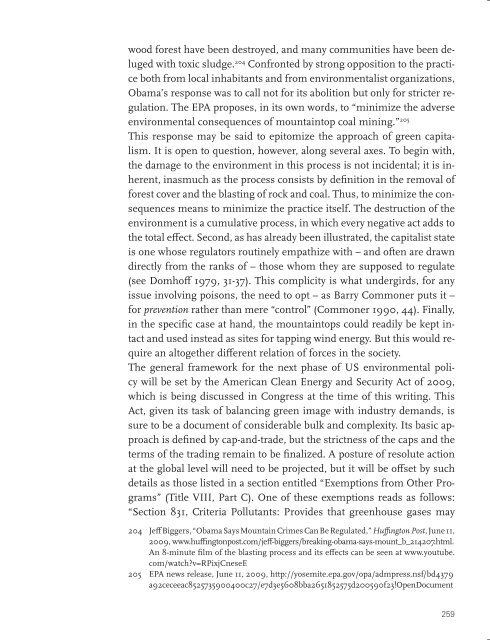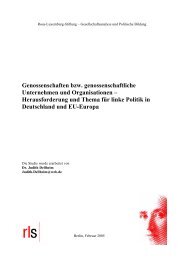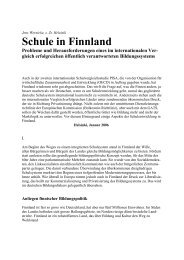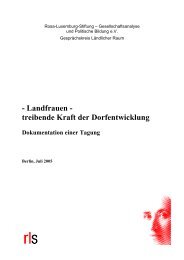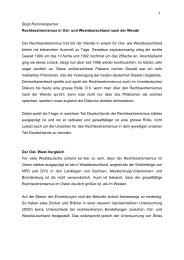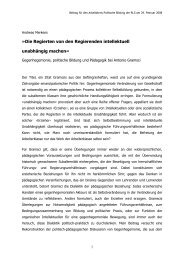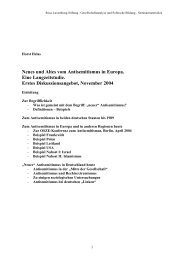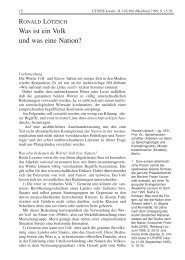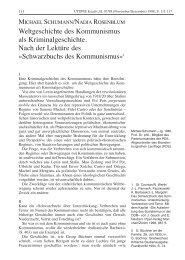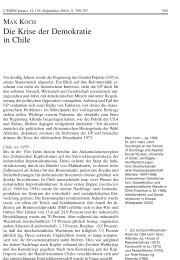Grünen Kapitalismus - Rosa-Luxemburg-Stiftung
Grünen Kapitalismus - Rosa-Luxemburg-Stiftung
Grünen Kapitalismus - Rosa-Luxemburg-Stiftung
Erfolgreiche ePaper selbst erstellen
Machen Sie aus Ihren PDF Publikationen ein blätterbares Flipbook mit unserer einzigartigen Google optimierten e-Paper Software.
wood forest have been destroyed, and many communities have been deluged<br />
with toxic sludge. 204 Confronted by strong opposition to the practice<br />
both from local inhabitants and from environmentalist organizations,<br />
Obama’s response was to call not for its abolition but only for stricter regulation.<br />
The EPA proposes, in its own words, to “minimize the adverse<br />
environmental consequences of mountaintop coal mining.” 205<br />
This response may be said to epitomize the approach of green capitalism.<br />
It is open to question, however, along several axes. To begin with,<br />
the damage to the environment in this process is not incidental; it is inherent,<br />
inasmuch as the process consists by definition in the removal of<br />
forest cover and the blasting of rock and coal. Thus, to minimize the consequences<br />
means to minimize the practice itself. The destruction of the<br />
environment is a cumulative process, in which every negative act adds to<br />
the total effect. Second, as has already been illustrated, the capitalist state<br />
is one whose regulators routinely empathize with – and often are drawn<br />
directly from the ranks of – those whom they are supposed to regulate<br />
(see Domhoff 1979, 31-37). This complicity is what undergirds, for any<br />
issue involving poisons, the need to opt – as Barry Commoner puts it –<br />
for prevention rather than mere “control” (Commoner 1990, 44). Finally,<br />
in the specific case at hand, the mountaintops could readily be kept intact<br />
and used instead as sites for tapping wind energy. But this would require<br />
an altogether different relation of forces in the society.<br />
The general framework for the next phase of US environmental policy<br />
will be set by the American Clean Energy and Security Act of 2009,<br />
which is being discussed in Congress at the time of this writing. This<br />
Act, given its task of balancing green image with industry demands, is<br />
sure to be a document of considerable bulk and complexity. Its basic approach<br />
is defined by cap-and-trade, but the strictness of the caps and the<br />
terms of the trading remain to be finalized. A posture of resolute action<br />
at the global level will need to be projected, but it will be offset by such<br />
details as those listed in a section entitled “Exemptions from Other Programs”<br />
(Title VIII, Part C). One of these exemptions reads as follows:<br />
“Section 831, Criteria Pollutants: Provides that greenhouse gases may<br />
204 Jeff Biggers, “Obama Says Mountain Crimes Can Be Regulated,” Huffington Post, June 11,<br />
2009, www.huffingtonpost.com/jeff-biggers/breaking-obama-says-mount_b_214207.html.<br />
An 8-minute film of the blasting process and its effects can be seen at www.youtube.<br />
com/watch?v=RPixjCneseE<br />
205 EPA news release, June 11, 2009, http://yosemite.epa.gov/opa/admpress.nsf/bd4379<br />
a92ceceeac8525735900400c27/e7d3e5608bba2651852575d200590f23!OpenDocument<br />
259


